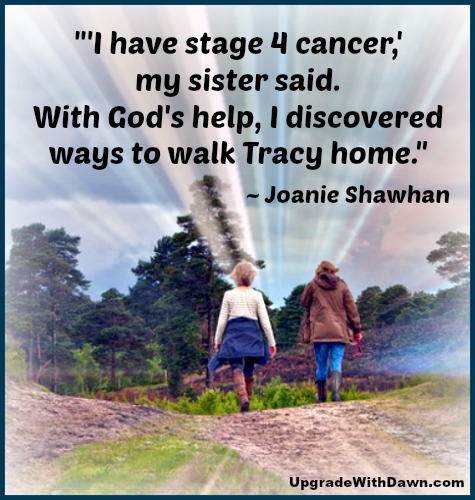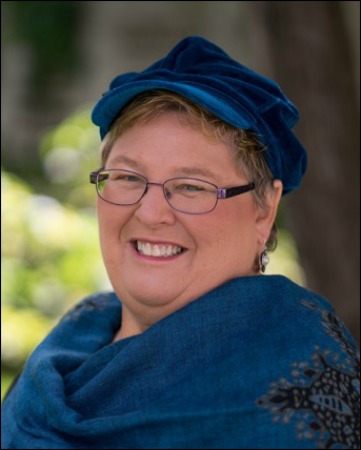When Your Last Living Parent Passes
Have you ever noticed that broken people—healed by God's grace—share His truth in a powerful way, straight from their heart? Yvonne Ortega is the author of the Moving from Broken to Beautiful® series.
In this Grief 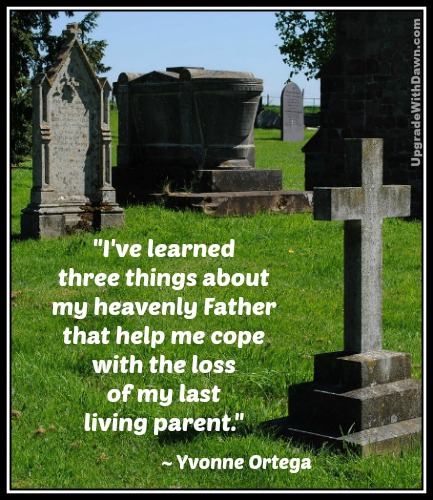 UPGRADE, she encourages us to seek God's caring presence and peace, just as she does.
UPGRADE, she encourages us to seek God's caring presence and peace, just as she does.
“‘Dad passed,’ my younger brother said on the phone. For a couple of minutes, I couldn’t say anything," Yvonne said. "Our last living parent passed.
"I felt broken again. Perhaps my brother felt the same way, but he didn’t say so.”
I (Dawn) still have one living parent, but I've thought about this topic many times lately.
I don't think we're ever prepared for a parent to die, but perhaps we can prepare our hearts to continue to live.
Yvonne continues . . .
Daddy wanted to live to be 100 years old. He got close to that, but his body wore out.
He had a massive heart attack on Palm Sunday, seemed to improve, but slipped away nine days later.
His mind also wore out. He had dementia.
I’ve learned three things about my heavenly Father that help me cope with the loss of my last living parent.
1. I’ve learned that God cares about orphans.
Psalm 68:5, in talking about God, says,
“A father to the fatherless, a defender of widows, is God in his holy dwelling” (NIV).
God is a Father to me. As a caring parent, He loves me, watches over me, and guides me. He will fill in the gap.
I can go to Him in prayer, call him "Father," and feel confident that He will be a faithful parent to me.
Deuteronomy 10:18a says, “He defends the cause of the fatherless and the widow.”
God will defend me. When the need arises, I don’t stand alone. I can run to Abba’s arms in confidence and feel safe.
2. I’ve learned to meditate on the names of God.
El Roi means the God who sees me. Since He sees me, God knows I experience bouts of loneliness. As God comforted Hagar in Genesis 16, He will comfort me.
God knows where I am and what I need.
Another name of God is Jehovah Shalom, the Lord is our peace. In Judges 16:24, Gideon built an altar to the Lord and called it "The Lord Is Peace."
I admit, every so often I want to call Dad, but remember I can’t do that anymore. Other times, I tell myself I need to buy more greeting cards for Dad. I used to mail him two cards a week. Then I remember he’s in heaven.
I’m happy for him, but I miss him. In those moments, I call on Jehovah Shalom and claim His peace in my life.
3. I listen to praise and worship music.
One of my favorite Scriptures about the importance of praise and worship is 2 Chronicles 20:21:
“Jehoshaphat appointed men to sing to the Lord and to praise him for the splendor of his holiness as they went out at the head of the army, saying: ‘Give thanks to the Lord, for his love endures forever.’”
My battle is coping with the loss of my last living parent. God’s Word showed me the most powerful weapon—praise and worship.
I praise God continually that my father accepted the Lord last summer.
Then I fight the battle with God’s love and strength as He brings me to a more beautiful tomorrow.
What will you do when you lose your last living parent or feel lonely because of other circumstances?
Yvonne Ortega is a licensed professional counselor, a professional speaker, and a speaking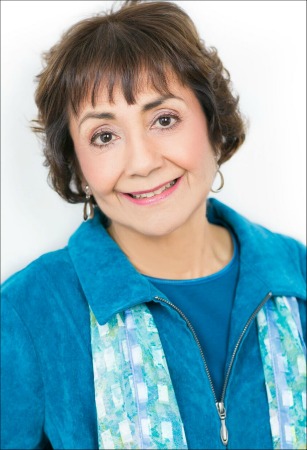 and writing coach. She’s the author of Moving from Broken to Beautiful®
and writing coach. She’s the author of Moving from Broken to Beautiful® 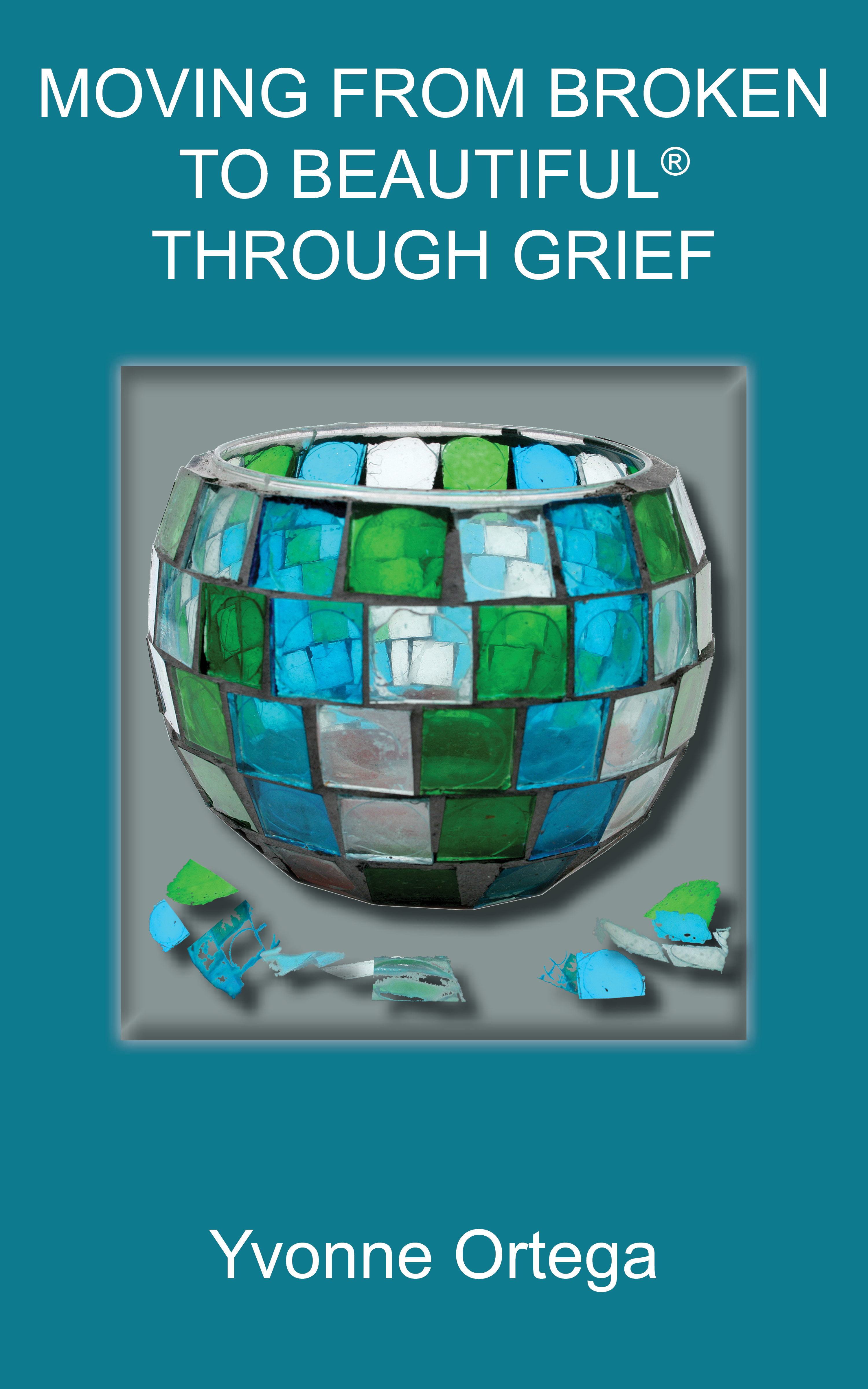 through Grief, Moving from Broken to Beautiful® through Forgiveness, Moving from Broken to Beautiful: 9 Life Lessons to Help You Move Forward, and Finding Hope for Your Journey through Breast Cancer. Yvonne will speak at a Moving from Broken to Beautiful® Conference October 19–20, 2018 in Virginia Beach and would love to bring that conference to your area. Visit her website.
through Grief, Moving from Broken to Beautiful® through Forgiveness, Moving from Broken to Beautiful: 9 Life Lessons to Help You Move Forward, and Finding Hope for Your Journey through Breast Cancer. Yvonne will speak at a Moving from Broken to Beautiful® Conference October 19–20, 2018 in Virginia Beach and would love to bring that conference to your area. Visit her website.
Graphic adapted, courtesy of Pixabay.
 1 Comment → Posted on
1 Comment → Posted on  Tuesday, June 5, 2018 at 8:20AM
Tuesday, June 5, 2018 at 8:20AM  Aging Parent,
Aging Parent,  Dead Parent,
Dead Parent,  Dying Parent,
Dying Parent,  Grief,
Grief,  Grief counsel,
Grief counsel,  Growing through Grief,
Growing through Grief,  Loneliness,
Loneliness,  Relationships,
Relationships,  Upgrade with Dawn,
Upgrade with Dawn,  Yvonne Ortega Upgrade Your Life
Yvonne Ortega Upgrade Your Life  Grief,
Grief,  Relationships
Relationships 




